| |
Observing
tips: Look
west 30 to 60 minutes after sunset when
the Sun has dipped 6o to 16o below the horizon.
If you see luminous blue-white tendrils spreading across the sky,
you've probably spotted a noctilucent
cloud. Although
noctilucent clouds appear most often at arctic latitudes, they have
been sighted in recent years
as far south as Colorado, Utah and Virginia. NLCs are seasonal,
appearing most often in late spring and summer. In the northern
hemisphere, the best time to look would be between mid-May and the
end of August. See also 2003,
2004, 2005,
2006 and 2007. |
 |
| |
| |
Photographer,
Location |
Images |
Comments |
|
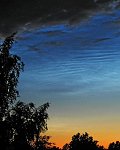
[movie]
|
Aigar
Truhin,
Sigulda, Latvia
Jun. 27, 2008 |
#1,
#2 |
Note
the dark tropospheric clouds scudding beneath the much higher-altitude,
glowing noctilucent clouds. |
|
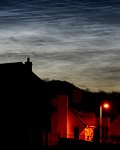

|
Conor
McDonald,
Northern Ireland Co.Derry Maghera
Jun. 27, 2008 |
#1,
#2,
#3 |
Very
bright display last night 4 or maybe even 5. Excellent structure
|
|
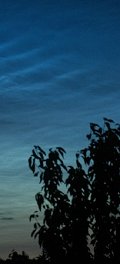
|
Krzysztof
Polakowski,
Gniewowo, Poland
Jun. 27, 2008 |
#1,
#2,
#3 |
Very
bright NLC clouds in Gniewowo North Poland. I went with
my girlfriend and a dog for a walk. After several minutes,
my girlfriend said "See those strange clouds? What is that?
This is beautiful. Thank you for taking me for a walk!"
Photo
details: Nikon D70s 400ISO Nikkor 3.5 2s. |
|
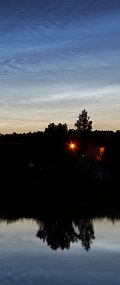
|
Arvydas
Četyrkovskis,
Vilnius, Lithuania
Jun. 26, 2008 |
#1 |
I've
spotted noctilucent clouds only two times this year, but
yesterday it was a very spectacular sight here in Lithuania.
Howewer it vanished very quickly, after almost an hour from
taking this shot.
Photo
details: Nikon D40, ISO 200, f/9, 30s exp. |
|
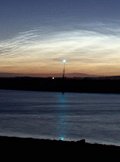
|
Declan
McCormack,
Mornington, Co Meath, Republic of Ireland.
Jun. 26, 2008 |
#1,
#2,
more |
This
was the first time i managed to capture a noctilucent cloud
display, it was so bright.I was lucky as i was out walking
the dog late when i saw the display it was approx 11.30
GMT. I hurried home to get my camera a canon 400d and drove
to the nearest location with a nice foreground this image
was taken approx midnight GMT.The building is an old light
house marking the entrance to the Boyne river from the Irish
sea at Mornington, Co Louth, Ireland, i think it looks a
little like one of the Apollo lunar modules
Photo
details: Camera Canon 400D, Lens Canon 18 - 55mm,
exposure 20 seconds, iso 800, f-ratio 5.6 |
|
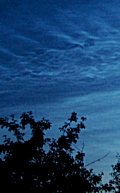
|
Irmantas,
Raguva, Lithuania
Jun. 26, 2008 |
#1 |
Photo
details: Olympus u740, exposure time 1,3s ISO-100
|
|

|
Grant
Privett,
A mile south of New Quay on the west coast of Wales, UK.
Jun. 27, 2008 |
#1 |
Taken
from just south of New Quay on the Welsh coast at around
1am on the 27th June 2008 by Grant Privett. Initially very
low over the horizon and difficult to see (about half as
high up the sky as Capella), but it became much brighter
and spread across the northern horizon covering twice the
length of The Plough. Very obvious, even after the Moon
rose. Lasted until the onset of dawn drowned it out with
continual variation in intensity. Nothing was visible 30
mins earlier. Image is a single 60s exposure with a Panasonic
DMC-FZ7 perched on a fence post. The distant lights are
on the Llyn peninsula in north Wales. |
|
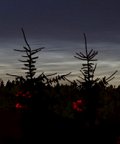
|
Lukas
Ronge,
Trutnov, Czech Republic, Europe
Jun. 26, 2008 |
#1,
#2, #3,
more |
There
was very bright Noctilucent clouds, low above horizont.
Captured by webcams and Canon EOS 350D. Exposure 5-30s,
ISO 100. Time: 20:25-21:50 UTC. |
|
|
|










